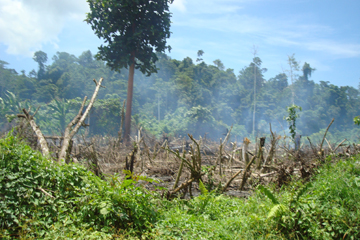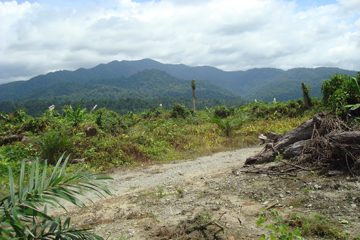Norway’s Climate and Forests Initiative, which has set aside billions of dollars for efforts to reduce deforestation, should work with the country’s Ministry of Finance to divest the Government Pension Fund from companies that destroy forests, says the Environmental Investigation Agency (EIA), an environmental group.
EIA is making a push on the issue just four days after the pension fund announced it had sold all of its shares in Malaysian logging conglomerate Samling Global after an investigation found evidence of illegal logging in Sarawak, a Malaysian state of the island of Borneo. While the sale represented less than 1 percent of Samling’s outstanding shares, the action sent a strong signal.
Now EIA is calling upon the Ministry of Finance to evaluate another $437 million in shareholdings in major forestry, agriculture, and related commodities companies that operate in Indonesia, Papua New Guinea, and Malaysia.
“Many have been linked to deforestation and other severe environmental damage,” read a statement from EIA. “Some have been
accused of illegal logging and land clearance, rights and labor abuses, corruption, and significant tax
fraud. All such activities would contravene the Ethical Guidelines of the Pension Fund if confirmed.”
Among the questionable holdings cited by EIA:
- $39 million worth of shares in Hong Kong-based Noble Group, which recently purchased a largely forested 32,000 hectare oil palm plantation license in Sorong, West Papua. When
EIA visited the plantation in April 2009 investigators met a four-year-old child who had been forced
to sign a multi-decade land release contract. Landowners reported receiving equivalent to $2.50 per
hectare, and complained that promised benefits had not materialized. Forest clearance is ongoing.

New forest clearing by Medco Papua Hijau Selaras (meaning Medco Papua Green Harmony) for oil palm outside Manokwari in West Papua. Medco’s Arifin Panigoro sits on the board of Conservation International.
- $1.2 million of shares in LG International Corp, and further shares
in Medco Energi International, which together control 170,000 hectares and seek a total of one
million hectares of forest in Papua for pulp and wood chip production. The land is part of a
controversial food and “green energy” estate project in Merauke where 1.6 million hectares is
targeted, but local and international opposition is becoming widespread. - $17.8 million of shares in the controversial Singapore-listed
Golden Agri Resources, which controls Indonesia’s oil palm and pulp plantation giant, Sinar Mas
Group. A recent independent assessment of Sinar Mas’ operations concluded that in one Indonesian
province “all concessions examined were found to have carried out land clearance before the EIA
[environmental impact assessment] was approved.” Sinar Mas is also clearing forests Lereh, Papua.
Norway’s Climate and Forests Initiative is the largest single source of funds for efforts to reduce tropical deforestation. In May, Norway pledged $1 billion toward forest conservation in Indonesia, which followed an earlier $1B commitment to Brazil and hundreds of millions in funds for Guyana, Tanzania, and Congo Basin countries.
“Norway and other nations are undermining their good intentions by
paying countries like Indonesia to protect their forests, with one hand, and investing in deforestation
without environmental or social safeguards with the other,” Andrea Johnson of EIA said in a statement.
Related articles
Norway divests from Malaysian logging company after rainforest destruction
(08/24/2010) The Norwegian Government’s pension fund sold all its 16 million shares of Samling Global, a Malaysian timber company, after concluding the firm had committed ‘serious transgessions’ in logging outside of concession areas and destroying protected rainforests, reports the Bruno Manser Fund. The sale, worth a total of $1.2 million, represents about 0.3 percent of the company’s outstanding shares based on today’s closing market price in Hong Kong.
Norway emerges as champion of rainforest conservation

(03/19/2009) While citizens in western countries have long paid lip service to saving rainforests, Norway has quietly emerged as the largest and most important international force in tropical forest conservation. The small Scandinavian country has committed 3 billion krone ($440 million) a year to the effort, a figure vastly greater than the $100M pledged — but never fully contributed — by the United States under the Tropical Forest Conservation Act (TFCA). Norway now hopes it can help push to include forest conservation in the successor to the Kyoto Protocol by providing funding and fostering cooperation among international actors like the UN and World Bank, as well as developing countries, to fund the creation of an international architecture which makes it possible to incorporate deforestation and degradation into a post-2012 climate regime.














